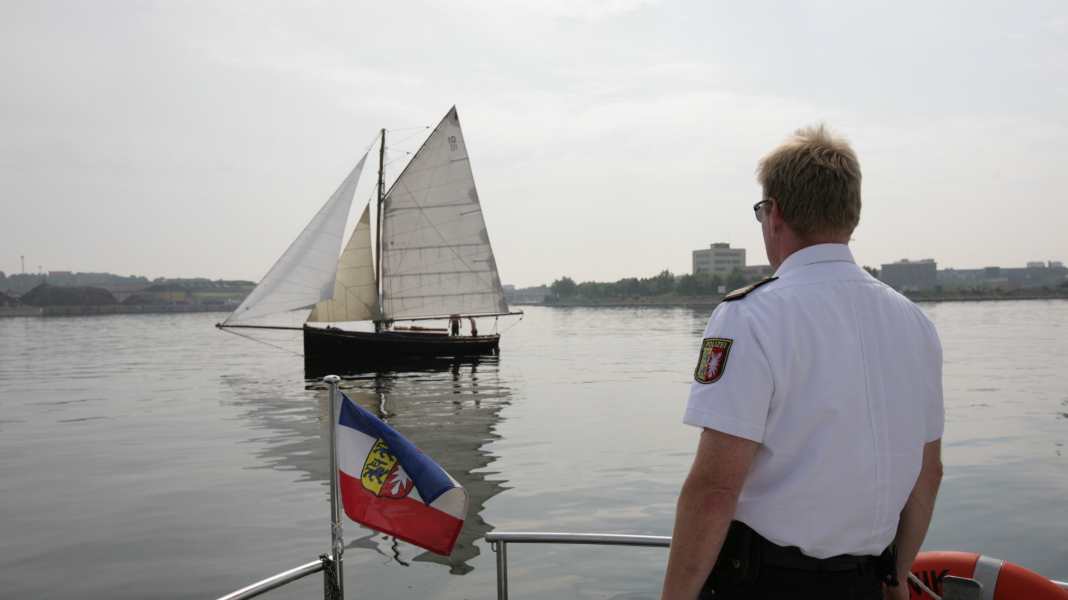Police checks: Will I be fined if I don't have up-to-date paper sea tickets?
Lasse Johannsen
· 04.06.2024

The camera team boarded the ship in Wilhelmshaven for a day on the Jade. Footage was taken to illustrate the purpose of the preventive checks. "It's primarily about the safety of pleasure craft," says police inspector Kevin Kofoth. "In particular, we check whether certificates of competency are available and whether the current nautical charts are being carried."
But the checks did not stop there. The film also shows the officers informing the owner of a sailing yacht that he would receive a fine. The reason was that he did not have up-to-date paper charts on board.
The skipper takes the threat of a 100 euro plus administration fee for outdated nautical charts in his stride. It was justified and the rules were clear.
The reactions online and numerous letters from readers show that not everyone feels the same way.
Fines - what are they actually?
Not every offence ends in court with a penalty; in the case of minor infringements, the law only provides for a warning, which can be issued free of charge or cost a fine. The next stage of escalation is a fine.
The fine procedure deals with minor offences to which the modern constitutional state does not want to react with the ultima ratio of criminal law. The relevant laws determine whether a fine may be imposed in a particular case. If it is not stated there, it is unlawful to levy a fine.
Unclear regulations
It is sometimes not easy for sailors to find out when they risk a fine. Unfortunately, there is no set of rules in this country that summarises what road users have to observe on the water. The relevant requirements and prohibitions for water sports enthusiasts can be found in numerous, highly diverse regulations, which are not easy to familiarise yourself with.
On the one hand, there are international agreements such as Solas and the COLREGs, along with numerous national implementing regulations. On the other hand, there are state and federal traffic regulations such as the Lake Constance Shipping Regulations or the Maritime Waterways Regulations, which supplement them and can compete with them accordingly.
Maritime duty of care
What applies in principle to all road users on the water is the nautical duty of care. This term also appears in various places in the law, for example in the COLREGs and the German implementing legislation. The Federal Ministry of Transport's brochure "Safety on the water", which is revised annually, serves as an aid to interpreting this undefined legal term. According to this, it is a requirement that up-to-date paper charts are on board.
What can be regarded as seamanlike care must be regarded as unstable. The technology available for pleasure craft plays just as much a role as the changing nature. The issue of GPS interference could currently play a role in the question of whether up-to-date paper nautical charts should be on board and lead to the chart being given more weight again in on-board practice and its absence being regarded as a breach of the duty of seamanship.
Consequences of the breach of duty
However, a breach of this duty typically only leads to consequences in legal practice if it is realised in a "success". By this, lawyers mean that something must happen. Otherwise, nothing happens apart from the fact that the risk increases, both your own and that of your fellow sailors.
However, a fine may not be imposed solely on the basis of a breach of the duty of care. And so there is no way around looking for where in the law you can find anything about current paper charts.
No compulsory equipment for privately used recreational craft
None of the relevant regulations contain a catalogue of mandatory equipment to be carried on privately used sailing yachts. Nevertheless, there are items that belong on board and whose absence can have legal consequences. For the reasons mentioned, it is not easy to find them in the law.
The obvious thing to do is to take a look at the Sea Recreational Craft Ordinance. This was issued just over 20 years ago in implementation of an EU directive, regulates the commissioning of recreational craft and contains an annex with equipment requirements.
For commercially used yachts, such as charter yachts, nautical charts are also mentioned in this annex to § 5 of the See-Sportbootverordnung, which specifies the requirements for the issue of the boat certificate, under serial number 22. However, they are not described in more detail there.
And: The regulation is in Section 3, which regulates the rental of pleasure craft. It is not aimed at owners who use their yachts privately.
Violations of the Ship Safety Ordinance
A search in the "Catalogue of fines and penalties for inland waterways and maritime waterways" finally leads to the Ship Safety Ordinance. This is the transposition of the Solas into German law.
In the catalogue of fines, the paper nautical charts are now mentioned under number 34.100410 in chapter 3, where the offences against the regulations in maritime navigation that are subject to a fine are listed.
The offence listed there is: "Failure to comply with the obligation to ensure that the following documents are always available on the bridge: the official editions of nautical charts and sea books required for the respective voyages." An obligation that follows from Section 13 (1) No. 2 of the Ship Safety Ordinance.
Controversial consequences
This is aimed at owners of ships that fly the federal flag. It is disputed among experts whether it also applies to privately used pleasure craft. One argument in favour is that it explicitly states: "... in the case of recreational craft within the meaning of the Recreational Craft Licence Ordinance - Sea, it is sufficient if non-official issues are carried on board". However, there are reasonable arguments in favour of both opinions. However, it would be up to a court to weigh them up and make a decision. And until that happens, everything else is speculation.
This is not the only reason why it is strongly recommended to have up-to-date paper nautical charts on board. They are not only the tools of the trade in times of uncertain GPS signals in the event of electronic failures, and it should therefore also be considered nautical prudence to have them on board.
You can still lodge an appeal against a fine notice.
Update from 4 June: How the police see it
When asked by YACHT, we received an "overall response from the water police of the coastal states of Lower Saxony, Bremen, Hamburg, Schleswig-Holstein and Mecklenburg-Western Pomerania".
According to this, the legal opinion of the penalising authority, the Directorate-General for Waterways and Shipping (GDWS), is that all recreational craft, whether used commercially or privately, must carry up-to-date paper charts of the respective navigation area, which may, however, be unofficial and may only consist of a section of a chart. This is clear from Section 13(1)(2) SchSV, which explicitly mentions recreational craft and does not differentiate between large and small recreational craft within the meaning of the See-Sportbootverordnung. Electronic nautical charts can currently only be used as an additional navigational aid for recreational boating.
The Waterway Police only consider nautical charts to be up to date if they are up to date with the latest version of the Notices to Mariners.
An appeal against the fine notice would then probably be rejected and the only option would be to go to the administrative court.
Related articles:

Lasse Johannsen
Deputy Editor in Chief YACHT
Born in Kiel, grew up on the water and on board, trained as a sailor in the club and sailing on the North and Baltic Seas. After school, navy and legal training, he worked as a trainee at YACHT from 2007-2009 in the Panorama department, which he now heads. He is also responsible for the special edition of YACHT classic, has published several books with Delius-Klasing and is deputy editor-in-chief of YACHT. Johannsen is an enthusiastic cruising sailor on his own keel and an active supporter of the German classic boat scene.

